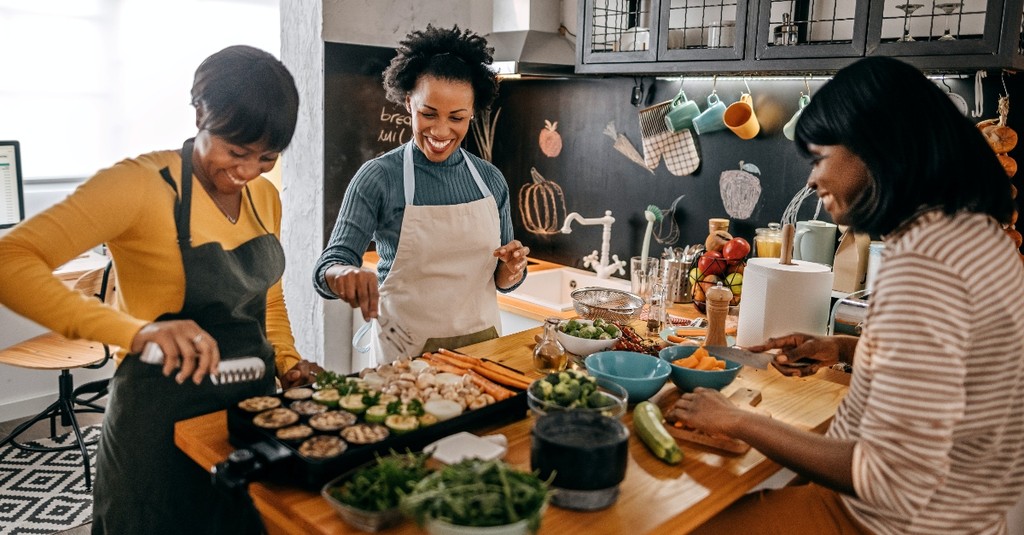
There is plenty enough to think about when a major holiday approaches. Will the grown children be able to come home this year? Is it the in-laws’ turn? Is the boss shutting up shop for the day, or do you have to work?
Ham, turkey, or fish? Apple or pumpkin pie? Will Aunt Jenny and Uncle Peter get along this year? Last year, they had a major fight, and Jonas was drunk — will he be sober this time?
Those are just some considerations, but many women will internalize others, including lies they believe about hospitality. Women: you might have adopted roles from your mother, grandmother, or aunt without thinking about them.
This Thanksgiving, give some thought to the issue of hospitality and what this means to you. If you are married, talk through the misconceptions that have added stress every year and turned what should be a beautiful holiday into a pressure-filled nightmare.
Sometimes, other members of the family (a parent or a spouse) perpetuate these myths. Popular culture such as movies and TV shows do not help.
Traditionally, women have been guardians of the kitchen where they are expected to excel, although modern shows are trying to show that men can cook, and women can mow the lawn.
But there are also women who insist that hospitality is up to them, even if they dislike this role; even if they are denying someone else the opportunity to contribute.
Photo Credit: ©iStock/Getty Images Plus/mixetto
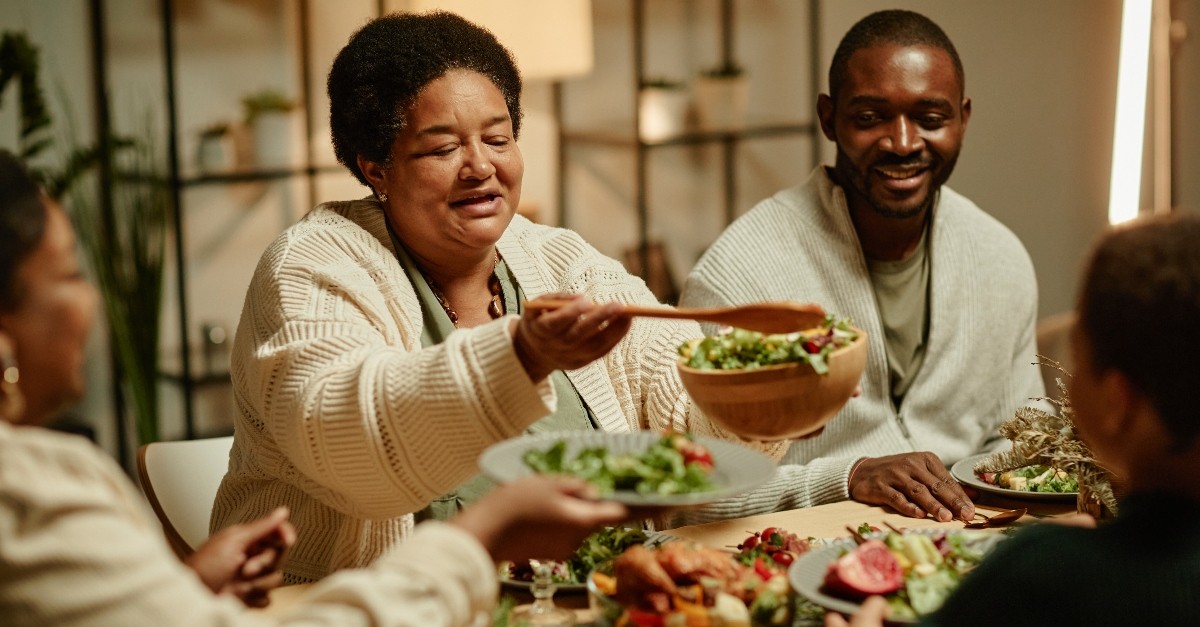
1. Hospitality Is for Women
When family and friends knock on the door, women are apt to jump into action. This is not to say that men will not, but studies suggest that women are still the nurturers, the ones who feed, clean, and serve. This makes them the obvious choice for extending hospitality.
But this is not biblical. Verses about serving are frequently gender-neutral. They are directed to the Church as a whole. “Do not neglect to do good and to share what you have, for such sacrifices are pleasing to God” (Hebrews 13:16).
The writer does not say “Woman, do not neglect…”. Paul wrote “contribute to the needs of the saints and seek to show hospitality.” Again, he does not address men or women but the Christian body as a whole.
Hospitality is an extension of loving our neighbors which is a command for all Christians, including men and children. This does not let women off the hook, but men should be extending hospitality also.
Women: doing all of the caring, cooking, and cleaning this Thanksgiving not only places undue stress on you; it also removes an opportunity for the men in your life to serve the Lord by serving others. Sometimes giving can be an act of taking, made worse if one resents the work.
Photo Credit: ©iStock/Getty Images Plus/SeventyFour
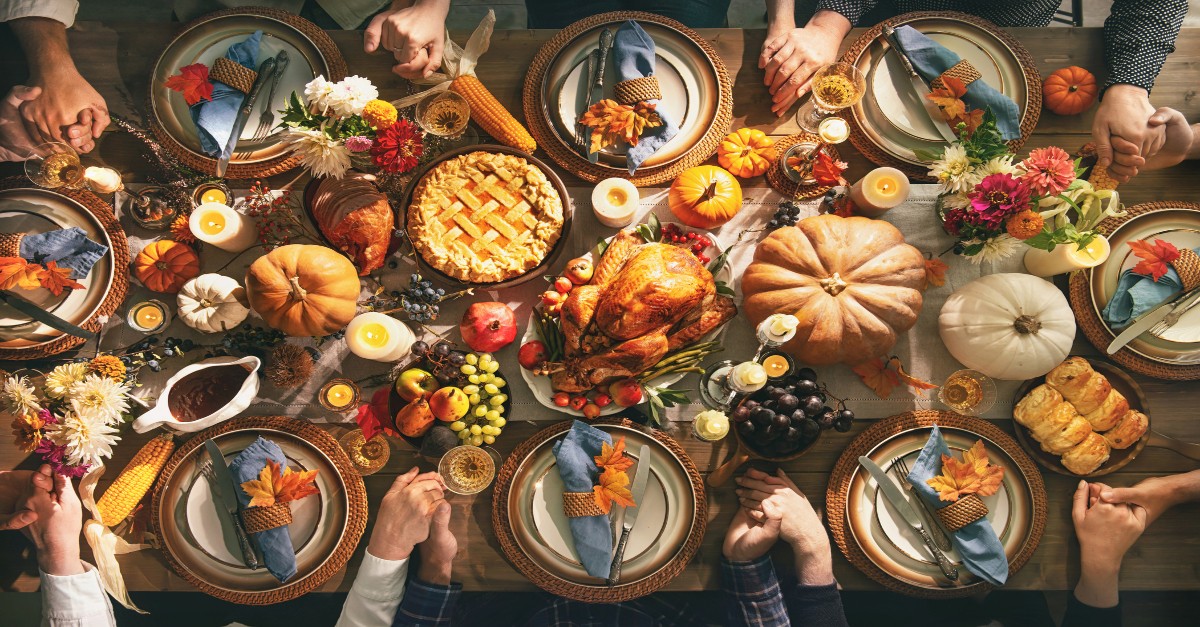
2. Hospitality Is about Full Bellies
Jesus enjoyed eating in the company of other people (Mark 2). “As he reclined at table [...], many tax collectors and sinners were reclining with Jesus and his disciples” (v.15).
John Piper pulls out scriptural references to a future hope which includes feasting. “One of the beautiful ways God describes the destiny of those who will accept salvation, his invitation, is a final feast with him in the age to come.”
With these pictures in mind, we see that food is an element of how we celebrate our current salvation and our future hope. And when we do this together, feasting is an aspect of fellowship.
So, for the women who will be cooking for a crowd, providing a feast for Thanksgiving is not necessarily bad — nor is it required that your table groans under the weight of it all.
There is the danger, of course, that celebration will turn into gluttony. “Be not among drunkards or among gluttonous eaters of meat, for the drunkard and the glutton will come to poverty, and slumber will clothe them with rags” (Proverbs 23:20-21).
Photo Credit: ©GettyImages/AlexRaths
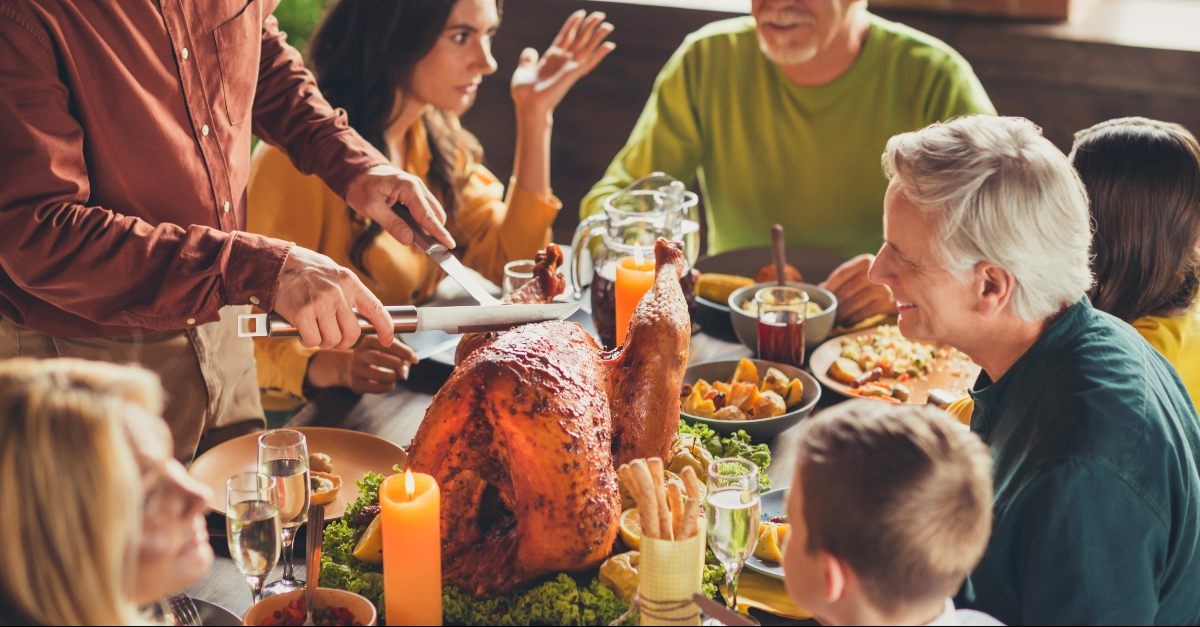
3. Hospitality Happens Around a Table
The Greek philoxenos or hospitality means “loving strangers.” Must one invite people into their homes, and serve refreshments, in order to love them? Romans 12:13 counsels Christians to “contribute to the needs of the saints and seek to show hospitality.”
While some of the words used to convey “hospitality” imply that one should invite strangers to lodge in their homes, or bring people over for dinner, philoxenos or philoxenia suggest that love is key, especially when loving involves welcoming people off of the lonely sidelines into fellowship.
“Owe no one anything, except to love each other, for the one who loves another has fulfilled the law” (Romans 12:13). Love can involve many types of service.
Women: you can offer hospitality anywhere you see a neighbor (that is, whomever the Lord puts in your way) this Thanksgiving.
Whether that means offering food, money, shelter, or a shoulder to cry on, you are demonstrating philoxenos.
And your obedience to the Lord’s urging is loving if you are truly thankful you could serve the Lord by going for coffee with a widowed, next-door-neighbor, a member of the church in need of prayer after service or going for a post-turkey walk with the aunt who always makes you feel like you are three years old.
Photo Credit: ©iStock/Getty Images Plus/Deagreez
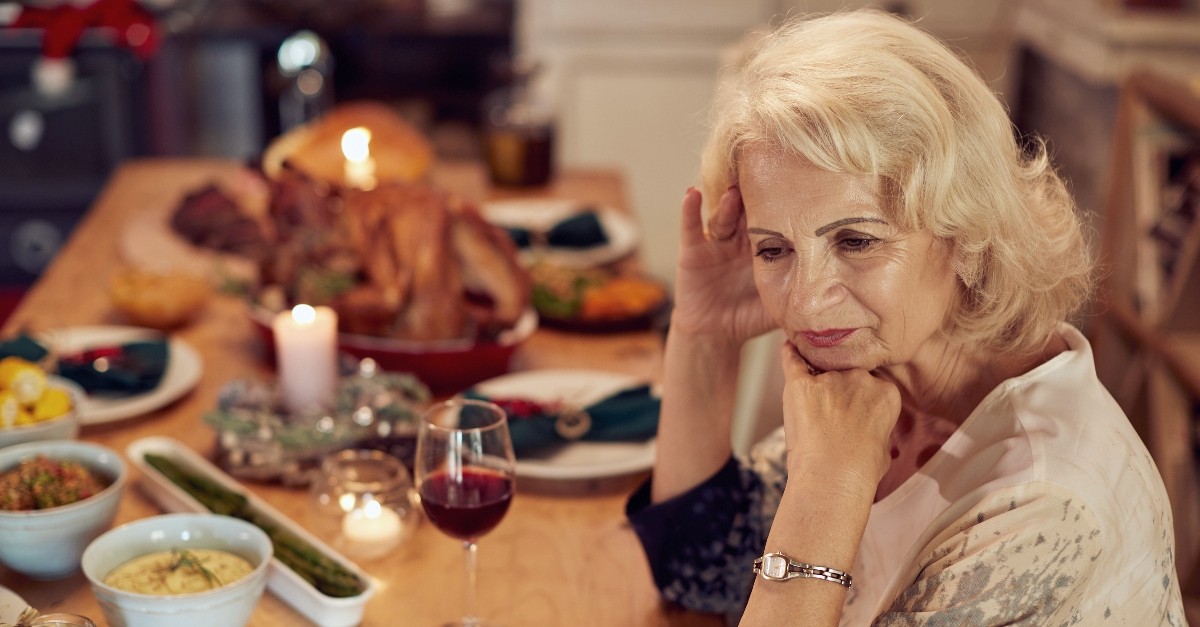
4. Hospitality Is Not My Gifting, So I Can Avoid It
The spiritual gifts are specific areas of service for which the Spirit has given individuals a particular passion. The gift of service might be extremely clear, or the gift of teaching.
An individual might be spread out evenly across leadership, giving, and exhortation. What if a woman enjoys leadership but does not have the gift of hospitality — should she ignore opportunities to serve the Lord and love her neighbors in this way?
Kathy Chapman Sharp observed that “our gifts are given not for our own benefit, but for the enrichment of others. We should be serving those around us, including the body of believers, family, and friends.
Romans 12:13, however, encourages us all to practice hospitality, whether it is our spiritual gift or not.” That is for the reason stated above: philoxenos means that we are to love strangers, and this is everyone’s calling.
Certain giftings imply imperatives for all Christians, so to not exercise hospitality because you do not feel a passion for serving people would be a sin of omission.
This is not to say that Christian women should open their doors to everyone — that would be dangerous, especially for single women. And this also does not mean that you should be a super-host this Thanksgiving.
What it does mean, however, is that the Lord will provide an opportunity for philoxenos whether in the home, at work (for those of you who will have to work this holiday season), at the 24-hour gym, or at the dog park.
Photo Credit: ©iStock/Getty Images Plus/Drazen Zigic
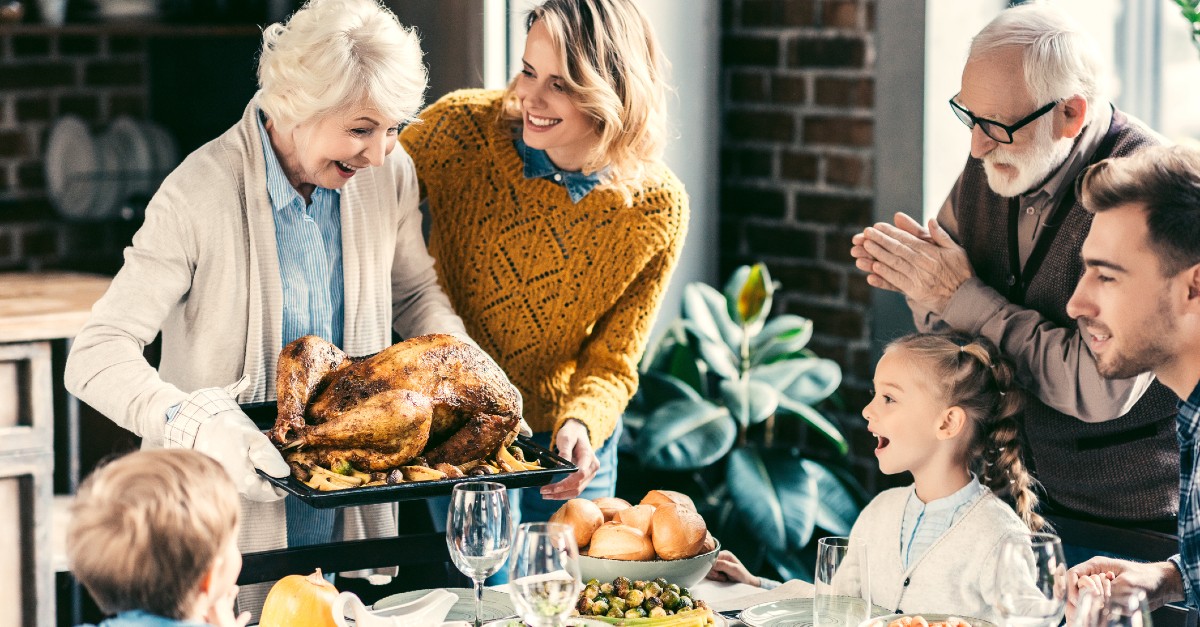
5. Hospitality Involves Big Groups of People
What if you are a single Christian female and you discover another single woman in your midst who has nowhere to go this Thanksgiving?
Now is your chance to provide fellowship, perhaps share the gospel with an unbeliever, and demonstrate the love of Christ in a way that gives Him so much pleasure.
As a single yourself, you know how it feels to watch others celebrating in their families. You know what it means to be offered this opportunity to be with another woman who knows how you feel.
In one sense, even in this one-on-one kind of exchange, you are giving someone a glimpse of the Kingdom of Heaven which is your home. You are inviting someone to view some part of your forever home when someone comes into your earthly home.
Sitting at two barstools over the kitchen counter sharing egg salad sandwiches and carrot cake, listening to someone’s story, and making that person feel loved and heard, is a demonstration of philoxenos. “Bear one another's burdens, and so fulfill the law of Christ” (Galatians 6:2).
Secular and Christian counselors agree that loneliness is a significant contributor to mental health problems.
Christ demonstrated his mercy towards those who were alone in the world such as the demon-possessed man, the woman with the 12-year bleed, and the woman at the well.
Isolation can kill; hospitality can make a difference to some lonely person in your life this Thanksgiving.
Photo Credit: ©GettyImages/LightFieldStudios

6. I Cannot Afford to Show Hospitality
Women who are very careful with the budget because they know it has to stretch a long way will balk at the idea of hosting Thanksgiving dinner. Their wages are not sufficient to invite anyone over for turkey or to buy a turkey for the family at all.
But as mentioned above, there are many ways to extend hospitality which are low-cost or even free. They do not even have to incorporate food.
Or, if you would like to create an experience for friends or neighbors, lower your expectations and let go of pride.
Lavishness is not essential; the point of hospitality is to show love, welcome others into your life, and encourage one another to experience the presence of Christ.
Moreover, hospitality is service, and Jesus declared “The Son of Man came not to be served but to serve” (Matthew 20:28).
Women, we serve because Christ served. None of the four gospels says that Christ served others by buying them things or giving them money. He was the gift.
Ladies, if you are strapped for cash but want your family to host a Thanksgiving event of some kind that will bring Christ to others, consider inviting your new neighbors for coffee before or after dinner. Or, if you really want to host Thanksgiving dinner, invite them to a potluck.
Photo Credit: ©Unsplash/Element5
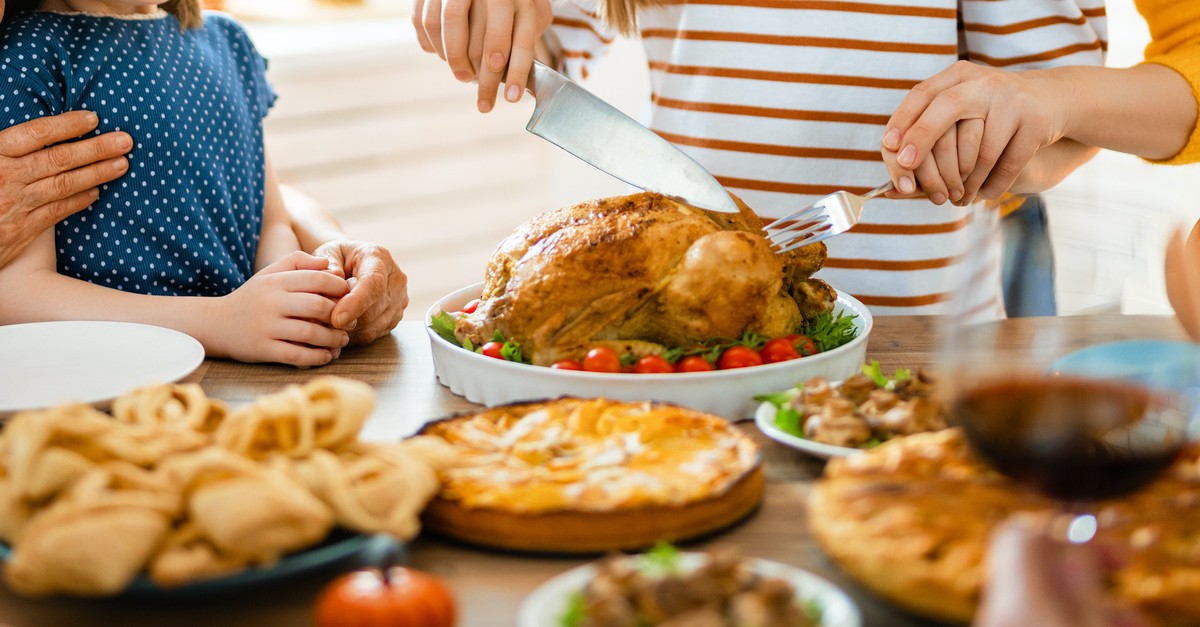
7. Hospitable Women Never Stop Serving
Christ rebuked Martha for being too busy to enjoy Him. That is a real problem women have at Thanksgiving and other holidays, where people create dirty dishes and stains on tablecloths. Sitting down to visit is a challenge for the neat-nut and you know who you are.
If someone’s drink is finished you have to fill it. If plates are empty, you bring out another tray of goodies. While the others play charades and laugh, you wash dishes, and (worse still), you secretly fume with irritation.
You can demonstrate love by serving others and even by humbly working in the background without expecting recognition (not with silent frustration). Perhaps you fulfill Peter’s instruction to “show hospitality to one another without grumbling” (1 Peter 4:9).
Yet, at its root, hospitality is about people. Love in action takes place between at least two individuals. Human connection is an essential part of the Christian life, which is why so many of the gospel exhortations talk about how to treat one another.
Serve each other. Encourage each other. And where strangers are concerned, “You shall treat the stranger who sojourns with you as the native among you, and you shall love him as yourself, for you were strangers in the land of Egypt: I am the Lord your God” (Leviticus 19:34).
God is glorified when women identify and challenge the lies that make them resent and fear Thanksgiving, Christmas, Easter, and every other major celebration. Take this opportunity to remember that your identity is not strapped to a food-laden table.
While you are thinking of all the reasons to give thanks, remember your first encounter with Jesus: was it around a table laden with turkey and fixings?
And, if a woman introduced you to your Savior, she must have taken time to be with you one-on-one. What a beautiful reason to give thanks.
For further reading:
3 Things to Keep in Mind When Hospitality Is Hard
What Can We Learn from Mary and Martha in the Bible?
3 Examples of Ruth’s Heart of Gratitude to Remember This Thanksgiving
Photo Credit: ©Getty Images/Choreograph

Originally published Monday, 23 October 2023.
